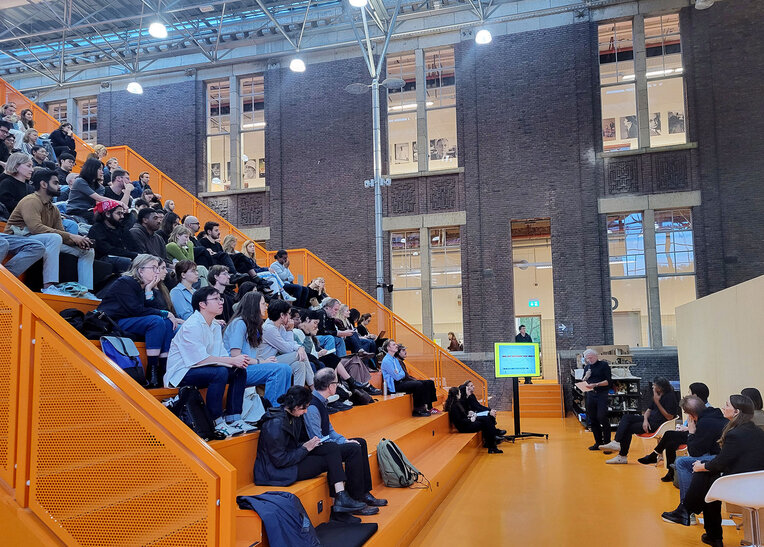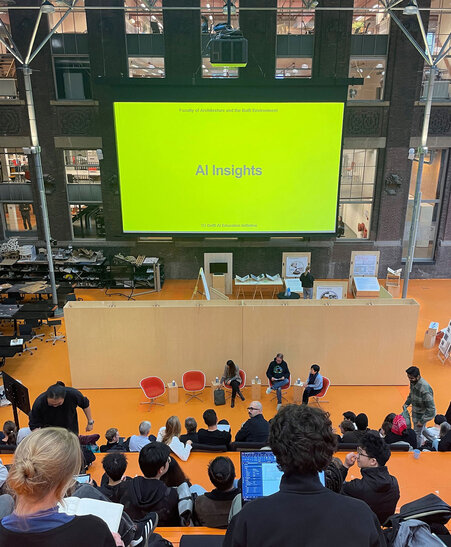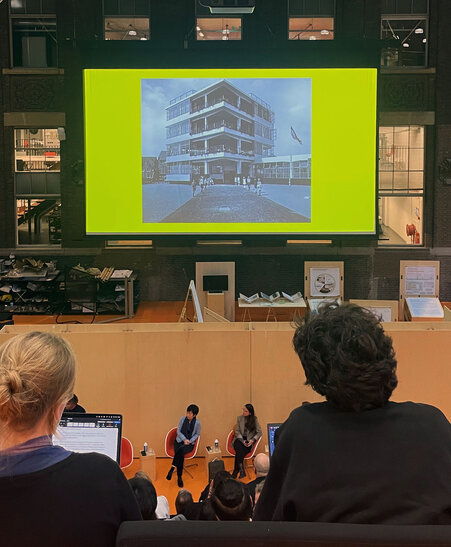Shaping the Future of Healthcare Design
The inaugural event of AI Insights, Reimagining Healthcare, took place on 17 October 2024. It focussed on how AI and emerging technologies can transform healthcare spaces. The event explored architects' evolving roles, the influence of data on hospital design, and the adaptation of medical spaces to new technologies.
Rethinking Care with AI and Design
Professor Georg Vrachliotis opened by framing AI as a tool for generating new knowledge rather than just a technology. Willem-Paul Brinkman, Head of the TU Delft AI Education Initiative, highlighted AI’s interdisciplinary potential, while architect and professor Kees Kaan emphasized the need for thoughtful, inclusive integration of AI into design.
A series of speakers examined AI’s transformative impact on healthcare. Dr. Dara Ivanova introduced the ‘place-perspective’, advocating for careful consideration of technologies like VR sedation and robotic care which risk distancing patients from caregivers. Professor Jan Carel Diehl addressed the environmental impact of medical technologies, noting AI’s potential to optimize hospital energy use while cautioning against reinforcing societal biases.
Dr. Qian Tao discussed building trust in AI for medical imaging, underscoring rigorous testing for applications in analysing heart and brain scans. Finally, industry expert Armand Paardekooper Overman shifted the focus to the built environment, advocating for architectural designs that promote healing through natural light and strategic layouts, ultimately reducing stress on healthcare systems.
This event was truly inspiring. The discussions were valuable, particularly Jan Carel Diehl’s example of using AI to address Cameroon’s doctor shortage, which highlighted just one of the innovative applications of AI explored that evening. I left feeling motivated and eager to see how these conversations evolve, and I’m already looking forward to the next AI Insights event!
Linda Kronmüller, PhD candidate
Empowering the Next Generation
Jess Chang, a PhD researcher at the Department of Architecture specialising in the intersection of technology, nursing, and design, introduced the speakers. The panel, moderated by Dr. Angela Rout, engaged in a debate on AI, stressing that while it could democratize healthcare, safeguards must prevent widening inequalities. They also noted that data are crucial not just for advancing technology, but also for emphasizing nature’s health benefits and informing policy. MSc students underscored the critical need to involve their generation by asking a series of provocative questions.
Tom Kobayashi envisioned everyone’s health data being fully accessible to combat diseases, but acknowledged the need to rethink privacy and regulation. Alexandra Muntean imagined how universal AI access could allow people in unstable regions to benefit from advanced technologies like bio-printed organs and robotic assistance. Djura Sjoerds sketched a future where untrained individuals could perform medical procedures with AI support, democratizing healthcare access.
Together, these reflections painted a future of healthcare driven by inclusivity, sustainability, and the ethical integration of AI, with an urgent call to address societal and regulatory challenges to ensure the equitability of AI-driven healthcare.
I joined the AI Insights event to hear fresh, interdisciplinary ideas about the hospital of the future—a topic we frequently explore with our students. Events like these are essential for unlocking the transformative potential of AI in architecture.
Nathalie De Vries, Founding partner MVRDV and Professor of Architectural Design, TU Delft
More information
AI Insights is a new educational series bringing together architects, scientists, students, and researchers to explore the intersection of design, science, and emerging technologies. Read more about this initiative, including the dates of upcoming events, on the dedicated webpage.
Read more about the Design, Data & Society Group , who organise these events, or visit the website of TU Delft’s AI Initiative .









